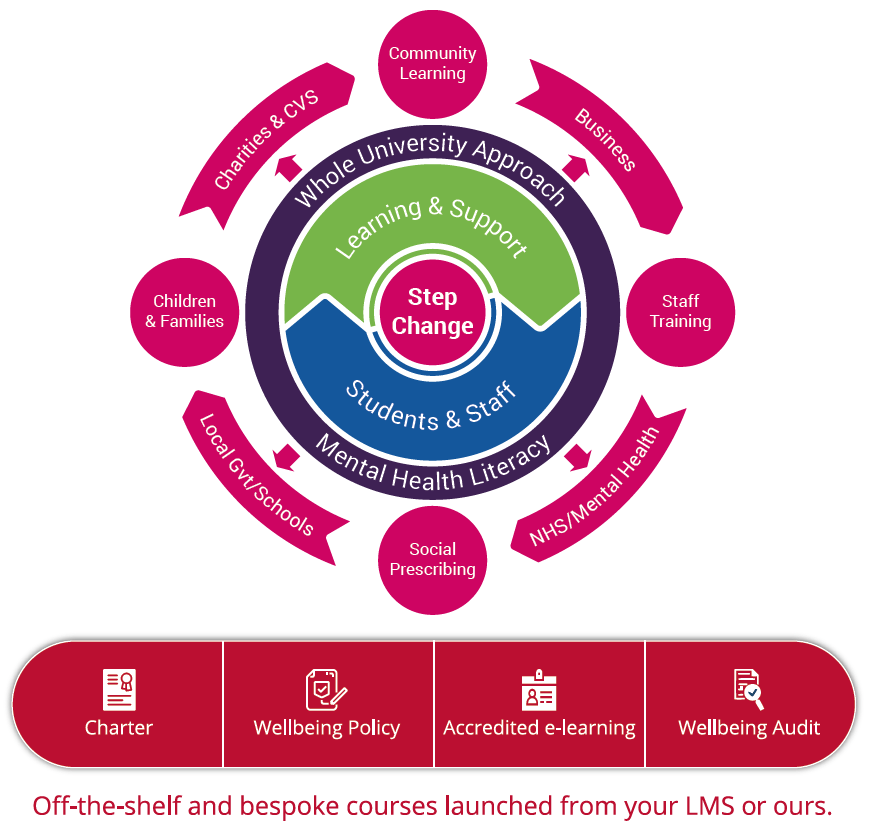Lots of good work is being done across high education institutions to address the issue of student and staff mental health and wellbeing. The Step Change Framework developed by Universities UK and the soon-to-be-launched University Mental Health charter are just two examples of how seriously the issue is being taken across higher education.
The framework looks to the psycho-social model of education which goes beyond the university to include parents, employers and the NHS. It is a truly holistic idea that student meStep Change Framework tal health needs to be tackled at the level of the whole individual, the whole university, the whole community and indeed the whole city. The framework emphasises the need for leadership and puts the university at the heart of a wider system where it can influence system-wide strategies on mental health prevention, providing sorely needed learning resources to local partners in the NHS, Local Government and industry. By getting their own house in order and collaborating with local partners, universities can make a real difference and become more relevant to the populations they serve.
Mental Health Literacy
The Mental Health Foundation defines mental health as “knowledge and beliefs about mental disorders which aid their recognition, management or prevention”. The World Health Organisation states that Health Literacy is perhaps the most important component of the social determinants of health. It states that Health Literacy “is a stronger predictor of an individual’s health status than income, employment status, education and racial or ethnic group.
Most of us don’t have the vocabulary to say what needs to be said in a way that can lead to real health improvements. To have useful and meaningful conversation we all need to learn the vocabulary and discover the fundamentals of mental health literacy. This is not about learning the jargon but being able to think, put a name to and describe the complex and painful thoughts and feelings in a way we can all understand.
One of the problems is that when people ‘say let’s talk about mental health’, what they really mean is ‘let’s talk about mental illness’. It’s important to learn about these conditions but there is a tendency to focus on things like anxiety, depression, eating disorders and a whole host of other pathologies. ‘Mental Health Awareness’ courses are often preoccupied with illness and rarely spend much time analysing the healthy mind and how to keep it that way.
There needs to be more talk about how to be proactive in maintaining and improving mental health. A new vocabulary is emerging about the psychological benefits that come from regular exercise, setting achievable goals and taking time to work out what is important and meaningful in ones life. It’s quite astonishing that many students can get to through to the end of their entire formal education without being invited to examine some of the ‘other’ facts of life and to prepare a road map, not avoiding, but navigating the difficult highways and byways on life’s journey.
One of the key underpinning messages promoted in Step Change is that universities need to be more proactive in promoting is self-care. This can only be achieved by providing some of the tools necessary to support staff and students in what could be described as behavioural model of change. We are often invited to talk about mental health but there is often confusion about what exactly we are supposed to say.
The idea of delivering face-to face training and running workshops for staff and students across the whole university is impractical and costly. What is clearly manageable is to implement an e-learning strategy across the entire institution as a means promoting mental health literacy, in order to achieve better self-care.
There is an ocean of leaflets, posters, videos, blogs websites and books loaded with information advice and guidance. This ‘library’ of information is all good and certainly promotes self-care, but it has been there for some time and it’s just not working. It’s not enough just to have the information sitting there. A change in behaviour is the evidence that learning has taken place and the best learning is delivered in an interactive and structured way around a particular set of learning objectives. All the better if the learning is reinforced by engaging and relevant content with quizzes and assessments along the way.
Bite-sized learning modules can go a long way to developing mental health literacy across the university and beyond. In this way we can employ a common language to talk about mental illness, mental health and the differences between the two. The modules may well have the added value of motivating individuals to take other steps towards personal development.
So, you can lead a horse to water … There is a strong case to be made for making mental health and wellbeing training mandatory for both students and staff. Most organisations have mandatory induction processes and most inductions would be greatly improved by an engaging piece of e-learning that deals with the fundamentals of emotional resilience, managing stress and applying mental health first aid.
It’s incumbent on employers to insist that staff do their online training in Health and Safety, Moving and Handling, GDPR etc. The reason this is so often done using e-learning is
- a) The employer has evidence that the learner engaged with the information and
- b) The employer has evidence to show the learner demonstrated sufficient understanding of the information.
If we are serious about putting mental health on an equal footing with physical health, universities and other employers must insist that all staff and students begin their journey with basic training in mental health literacy.
Key Points to bear in mind
- Get buy in from the top. If the commitment isn’t there from the leaders within the University, it will always be an uphill struggle to get the cross-discipline collaboration that is required.
- Appoint a project manager. Bring together all the disparate elements and deliver the strategy on time and within budget by appointing a project manager. Having a team that collaborates is essential but without one accountable individual at operational level pulling it all together, the strategy is less likely to If it’s everyone’s responsibility, then it’s no one’s responsibility.
- Avoid Mission Creep. Online learning is just one part of the broader prevention strategy. It’s important to stay focussed on a relatively small number of outcomes for staff and students/families. Four or five key outcomes are more powerful than a wish-list of 15 to 20. It’s not uncommon for more and more creative ideas is to feed in to the process and add to the complexity. ‘Mission creep’ is the enemy of a coherent focussed e-learning strategy.
- Maintain momentum. It’s crucial to have meetings where joint decisions are made but many a process has been ‘hamstrung’ by indecision, particularly where no one is accountable. Making things happen in large complex institutions is not easy but clarity of purpose along with proactive project management will win the day.
- Don’t re-invent the wheel. The institution already has the infrastructure in place to deliver organisation-wide learning. Strike a balance between co-designing new materials to meet the particular needs of the university and buying in off-the-shelf or ‘generic’ solutions. This will keep costs down and will help to embed the framework into the culture of the institution. It may be far more cost and time-efficient to buy in some digital resources than develop them from scratch yourself.
- Reference Group. Involve a small number of students and staff and provide them with clear terms of reference to participate in co-designing the strategy and signing off each step of the implementation strategy.
The Wellbeing Ecosystem
The Wellbeing Ecosystem system devised by Embrace Resilience, a social enterprise in Manchester, was originally developed with Big Lottery funding for primary schools in Salford, Greater Manchester in 2018. The platform was co-designed with schools to apply a whole school approach to improving the emotional resilience of children and families together with teachers and non-teaching staff at the schools. It has since been adapted for any organisation looking to adopt a whole person, whole organisation approach to mental health, emotional resilience and physical wellbeing.
It is essentially, a digital learning platform comprising e-learning modules, a wellbeing policy in the form of an interactive guide, together with a wellbeing charter and audit tools for the purpose of establishing baselines and data management for evaluation and research.
It is difficult to imagine a more cost-efficient way of raising awareness, training and measuring learning and engagement across a large dispersed audience. Some of the e-learning modules are generic and others, targeted towards specific audiences such as students, the university workforce, families and health & care practitioners.
While the Wellbeing Ecosystem may run through the core of the prevention strategy, it needs to be backed up with other tools and some form of traditional face to face training methods. E-learning can go a long way to supporting students and staff in developing Mental Health Literacy to develop the behaviours that lead to improved emotional resilience, mental health and physical wellbeing.
How We Work
Embrace Resilience have adapted the Wellbeing Ecosystem to deliver e-learning courses on Mental Health Literacy across the university and beyond. It can work as a stand-alone platform or be delivered using existing channels at the university.



